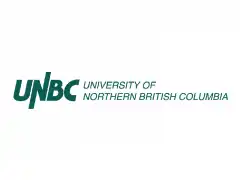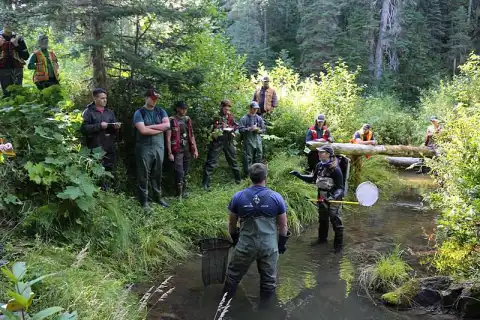Bachelor of Science - Wildlife and Fisheries
- 4 years
- Duration
- 26,750 CAD/year
- Price
- Rolling admission
- Start
- Rolling admission
- Deadline
- Bachelor
- Degree
- Campus
- Format
- Prince George / Canada
- Location
Program description
Students who enroll in the BSc Wildlife and Fisheries program gain a thorough understanding of wildlife and fisheries biology as well as extensive hands-on experience in both indoor and outdoor laboratories. In doing so, students are introduced to a holistic method of addressing resource problems.
The Wildlife and Fisheries degree prepares students for careers in the public and private sectors, as well as for doctoral study in wildlife and fisheries science, through a blend of theoretical and applied ecology with practical labs and exercises.
Students who complete the Wildlife and Fisheries degree program will have met the academic criteria for the RPBio designation in British Columbia.
Program structure
Lower Division
100 Level
- Introductory Biology I
- Introductory Biology II
- Introductory Biology I Laboratory
- Introductory Biology II Laboratory
- General Chemistry I
- General Chemistry II
- General Chemistry Lab I
- General Chemistry Lab II
- Calculus for Non-majors
- Field Skills
- Introduction to Natural Resources Management and Conservation
- Communications in Natural Resources and Environmental Studies
- Writing and Communication Skills
- Introduction to Physics I
- General Introduction to Physics
200 Level
- Ecology
- Genetics
- Organic and Biochemistry
- Forest Plant Systems
- Systematic Botany
- Introduction to Soil Science
- Terrestrial Ecological Classification
- Introduction to GIS
- Introduction to Wildlife and Fisheries
- Basic Statistics
Two of the following:
- Invertebrate Zoology
- Plant Biology
- Animal Diseases and Parasites
- Introduction to Earth Science
- Hydrology
- Integrated Resource Management
Upper Division
300 Level
- Limnology
- Ichthyology and Herpetology
- Ornithology and Mammalogy
- Evolutionary Biology
- Ecological Analyses
- Environmental Impact Assessment
- Natural Resources, Environmental Issues and Public Engagement
- Environmental and Professional Ethics
- Aboriginal Perspectives on Land and Resource Management
- Society, Policy and Administration
400 Level
- Aquatic Plants
- Plant Ecology
- Fish Ecology
- Population and Community Ecology
- Wildlife Ecology
- Wildlife Management
- Fisheries Management
- One of the following:
- Conservation of Aquatic Ecosystems
- Conservation Biology
- Field Applications in Resource Management
- Natural Resources Planning
- Conservation Planning
- Watershed Management
Price
- Tuition* 26,750 CAD
- Student Fees* 1,315 CAD
- Books* 1,400 CAD
*Tuition, fees and books are subject to change and vary among programs.
Requirements for applicants
- Meet UNBC's English language requirements
- Meet the international admission requirements by country or meet the admission with a General Certificate of Education (or equivalent)
- Complete the required high school course equivalencies outlined in the Domestic tab prior.
About the university

One of Canada's top universities, UNBC is situated in the breathtaking scenery of northern British Columbia.
Excellent undergraduate and graduate learning opportunities are offered by UNBC in the areas of cultures, economics, health, sciences, and the environment. We share the exhilaration of new knowledge with our students and the results of our teaching and research with the world as one of British Columbia's research-intensive institutions. UNBC is a welcome place with a warm, inclusive, and supportive learning environment in addition to cultivating and celebrating academic excellence.
The University of the North by and for the North is UNBC. Our students, alumni, teachers, staff, and the communities we serve all feel a strong sense of ownership, purpose, and adventure as a result of our goal. We are also Canada's Green UniversityTM, paving the road for everyone's future to be more sustainable.
Vision
To affect people's lives and communities in the North and around the world while being Canada's top destination university in terms of personal character.
Mission
To have an impact on the world today and inspire future leaders.
UNBC's Academic Structure
- Faculty of Environment
- Faculty of Business and Economics
- Faculty of Human and Health Sciences
- Faculty of Indigenous Studies, Social Sciences and Humanities
- Faculty of Science and Engineering
- Division of Medical Sciences
Read more about University of Northern British Columbia, Canada





